BYD K9
| BYD K9 (ebus) | |
|---|---|
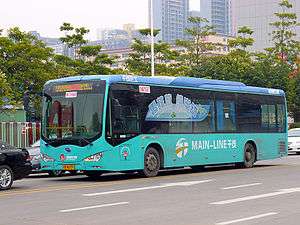 | |
| Overview | |
| Manufacturer |
Changsha BYD Coach Company, Ltd (a Shenzhen BYD Auto Company, Ltd. subsidiary) |
| Production | 2010–present |
| Assembly |
Changsha, Hunan, China Lancaster, California, United States Dalian, Liaoning, China |
| Body and chassis | |
| Class | Battery electric bus |
| Body style | Single-decker bus |
| Doors | 2 or 3 |
| Floor type | Low floor |
| Related | BYD K11 |
| Powertrain | |
| Engine | Wheel hub electric motors |
| Electric range | 250 km |
| Dimensions | |
| Wheelbase | 244 in (6.20 m) |
| Length | 39.37 ft (12.0 m) over bumpers |
| Width | 100.4 in (2.55 m) over body |
| Height | 126 in (3.20 m) over roof battery |
| Curb weight | 30,423 lb (13,800 kg) curb weight |
| Chronology | |
| Predecessor | None |
| Successor | None |
The BYD K9 (sometimes just referred to as the BYD ebus or BYD electric bus) is a battery electric bus manufactured by the Chinese automaker BYD Auto, powered with its self-developed lithium iron phosphate battery, featuring the longest drive range of 250 km (155 miles) on one single charge under urban road conditions.
The first BYD battery electric bus was manufactured on September 30, 2010 in Changsha city of Hunan province. It followed models like F3DM, F6DM and e6. K9 has a 12-meter body length and 18-ton weight with one-step low-floor interior. It is reportedly priced at 2–3 million yuan (S$395,000 - S$592,600).[1] It has been running and/or tested in China, India,[2] Japan,[3] Hong Kong, U.S., Colombia, Chile, Spain, Netherlands, Denmark and Aruba.[4][5][6][7][8] More than 200 K9s in service in Shenzhen had accumulated over 9,216,000 km (or 5,529,600 miles) by the end of August, 2012.[4][9]
In both 2011 and 2012, BYD obtained orders from amounting to 1200+ units.[10][11][12][13] The company extended its production base in Tianjin, China at the end of July, 2012[14] and may plan to manufacture in Brazil[15] and Windsor, Canada.[16] BYD built and operates an electric bus factory in Lancaster, California, US. The new factory started production in October, 2013.[17] In December 2014, another manufacturing plant began operation in Dalian, Liaoning, China.[18]
Specifications
Official specifications
BYD's official specs publication on its electric bus includes:
- Electric power consumption: less than 100kWh/60mins[19]
- Acceleration: 0–50 km/h in 20s[19]
- Top speed: 96 km/h[19]
- Normal charge: 6h for full charge[20][21]
- Fast charge: 3h for full charge[20][21]
- Overnight charging: 60 kW maximum power for 5h full charge[20]
- Range: 155 miles (249 km)[20][21] (186 miles (299 km) according to some reports)[21]
- Length*Width*Height: 12,000mm*2,550mm*3,200mm[22]
- Standard seats: 31+1 (31 for passengers and 1 for driver)[22]
- Weight: 18,000 kg[22]
- Clearance between one-step entry and ground: 360mm[22]
Two or more versions of this bus have been exposed. The two-door version is in service in China's Shenzhen, Changsha, Xi'an and Shaoguan while the 3-door version operates in Shenzhen, Bogota[4][9] etc. for test and demonstration purposes.
Battery and powertrain
K9 is powered by LiFePO4 batteries, which have been applied to BYD e6, BYD DESS and other energy storage products. BYD claims that the chemical materials contained in the battery can be recycled without any toxins.[20] K9's power system uses an in-wheel motor drive and hub reductor. The max power output is 90 kW*2 and the max torque is 550Nm*2. Solar panels fixed on the vehicle were once reported to supplement the onboard batteries. They were included on demo units, but not on commercial units.
Safety
Safety features include unitary construction body, 4-wheel disc brakes, ABS+ASR, one-step easy-pass with special footplates for wheelchair access and non-step inside.
Body and interior design
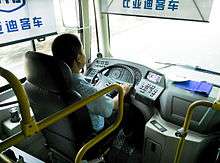
The body comes silver, yellow or green (for different markets). In the silver version the front windscreen occupies two-thirds of the front of the bus for maximum visibility.[20] It includes adjustable leather seating for driver and red and black leather seats for passengers.[19] The battery packs are laid in the vehicle rear on both sides inside the two cabins.[23]
Costs
BYD calculates that a BYD ebus over 8 years saves about $190,000 in energy costs.[24] In 2012, the price for a BYD ebus was €380,000 Euros, €100,000 more than a comparable diesel bus.[25]
Policies
At a press conference in Beijing on November 4, 2012, BYD announced "Zero vehicle purchase price, Zero costs, Zero emissions", to promote the sale of its e6 and K9. The initiative is supported financially by China Development Bank from a fund totalling over 30 Billion RMB ($4.6B USD), and allows buyers to finance 100% of the purchase price with no down payment, paying a lease rate that effectively costs less than regular monthly operational expenses.[26][27]
Under the scheme, available in China,[27] public transport operators can choose the ownership model from three different options:[28][29]
| Model | Financing body | Lease period | Ownership |
|---|---|---|---|
| Financial Lease | Finance Company | A complete operational life cycle (e.g. 5 years) | During the lease period, the financial organization owns the vehicle. The taxi company pays the lease in installments. After the lease period ends, the taxi company owns the vehicle. |
| Operational Lease | Third party vehicle lease company | A complete operating life cycle (e.g. 5 years) or a shorter period (e.g. 1 year) | During the lease period and thereafter, the vehicle lease company owns the vehicle. The taxi company and the vehicle lease company sign an operational lease contract. |
| Buyer's Credit | The Taxi Company | The taxi company owns the vehicle. The taxi company pays monthly installments to the financial institution. |
The company explained the concept of "Zero Costs" by comparing difference between the five-year cost of running a conventional taxi in Shenzhen, as against its all-electric taxicab. It came to the conclusion that "if the car runs for 5 years, and the total saving over 5 years is deducted from the higher cost of the vehicle and the interest on multiple payments, it can save 326,400 RMB.[27][28][29] The company also claimed that if enough distance is covered, "the vehicle payment will be entirely offset".[27] BYD also promoted the "Zero Emission" feature of its renewable-energy vehicles by stating that "an e6 electric taxi saves 14,120 litres of fuel per year, with 32 tonnes fewer CO2 emissions", and "169 million litres of fuel could be saved with CO2 emissions reduced by 38.62 million tonnes per year" if all Chinese taxis were to be replaced with its electric vehicles.[28][29]
Global launch
Worldwide
In 2015, BYD sold about 6,000 of these buses worldwide.[30] BYD became the world leader in the sale of electric vehicles in 2015.[31]
Mainland China
- 200 units were delivered to the Shenzhen public transmit system to serve the Universiade 2011 in August, 2011 and remained as part of this city's transport system. This (world's largest) electric bus fleet had reportedly accumulated over 9,216,000 km (or 5,529,600 miles) by the end of August, 2012.[4][9] By 2017 the fleet had increased to 780, covering more than 106,000,000 km (66,000,000 mi).[32]
- 2 buses began trial service in Changsha 100 more were expected to begin service there in 2012. BYD's Changsha facility was to produce 20,000 passenger vehicles and 400 pure electric buses, increasing to 3,000 electric buses and 100,000 passenger vehicles in 2013.[8][33]
- 3 K9s began service in Shaoguan, Guangdong province in November 3, 2011.[5][34]
- 4 K8s began service in Xi'an in August 2012 with another 46 units expected to join them around the end of 2012.[5][7]
- Haikou City began testing K9s in August 2011.[35]
- In July 2012 BYD and Tianjin Public Transportation Group Ltd agreed to set up a joint venture to produce new energy vehicles.[12][14] It became the company's second K9 production site in mainland China.
- The largest K9 fleet since 2014 was in Dalian, 600 units. A further 600 vehicles was planned to arrive in 2015.[36]
- In May 2014 BYD announced an order of 2000 ebuses and 1000 eTaxis for Hangzhou. As of 2014 China about 500,000 conventional city buses were in daily use. BYD sold in 2014 in the first quarter more than 4,000 vehicles, while sales of former market leader Daimler dropped by 20% in 2013.[37]
North America
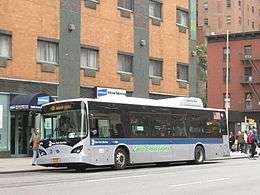
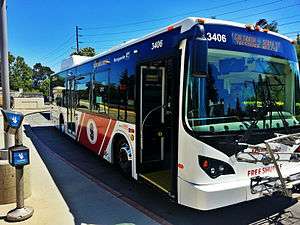
- BYD announced its bus in the US at the 16th BUSCON in Chicago on September 13, 2011.[38] BYD supplied one K9 bus to be retrofitted with WAVE’s wireless charging pad under the bus, developed by the Utah State University Energy Dynamics Laboratory in 2012.[39]
- The city of Windsor, Ontario signed a letter of intent to order as many as 10 BYD electric buses in May, 2012.[40][41]
- BYD has supplied the Los Angeles Metro system with buses since 2015. A 2018 investigation by the Los Angeles Times found reliability issues with the BYD buses.[42]
- Aruba[43] plans to use BYD by 2020. The country signed a memorandum of understanding (MOU) with BYD to place four BYD buses and one e6 electric taxi for public/government use, to be in service by the end of September 2013.[44]
- The Regional Transportation District in Denver, Colorado ordered 36 BYD buses for use on their Downtown Mall Shuttle.[45]
- TransLink, which services Vancouver, British Columbia began a three-month trial of BYD bus in May 2017.[46]
South America
- On June 20, 2012, BYD and Chilean collaborator INDUMOTORA Company secured a contract with ALSACIA, one of the biggest operators in Santiago's public transport system, for 5 K9 units.[47] However up to now, METBUS, another operator of Santiago's public transport system, operates two BYD K9FE units.
- BYD scheduled a large commercial operation of its K9 in Brazil and set up a bus production factory there which, however, is not certified by BYD. The mayor of Sao Paulo, Brazil confirmed plan to introduce at least 5 BYD electric buses to Sao Paulo by the end of 2012.[48]
- At the beginning of 2012, BYD and Buquebus officials signed a contract to begin importing 500 buses into Uruguay. According to Bernama, the first buses would arrive in Uruguay before during 2012 with 500 buses running by 2015.[11][12]
- BYD entered a fuel-efficiency testing program in Colombia run by the Clinton Climate Initiative (CCI) and InterAmerican Development Bank (IADB). Running against diesel and CNG-hybrid buses on a 12-mile route that took between 60 and 90 minutes to complete, BYD won by achieving a 7.3 km/liter-equivalent by measuring costs and 11 km/liter-equivalent measuring by energy output. Peru has also tested BYD's electric bus.[49] A fleet of 12-meter 80-passenger units was to be delivered to Bogotá for trial operation as of Q2 2013. The first one-month stage of this project was to focus on testing the fleet on operational performance, energy consumption, battery behavior and total energy consumption.[50]
East Asia, Southeast Asia & South Asia
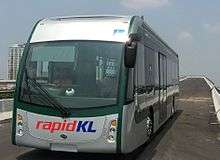
.
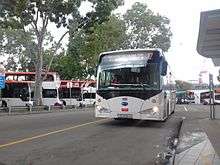
- Hong Kong: In July, 2011, the BYD Hong Kong Research and Development Center opened with a group of six engineers, in cooperation with its existing development team. The Kowloon Motor Bus fleet reportedly ordered 10 buses from BYD. The first unit arrived in September 2012. The public transit service planned to test the units on three transmit lines. The Kowloon Motor Bus BYD bus was eventually returned to BYD. However, KMB ordered 10 BYD K9R with Gemilang body and delivered in 2017. Long Win Bus ordered 4 BYD K9R with Gemilang body and delivered in 2017. Citybus and NWFB ordered 5 BYD K9R Electric buses from BYD Auto of China.[51][52]
- India: In December 2013, Bangalore Metropolitan Transport Corporation planned to start a three-month test of a K9.[53][54]
- In 2018 June 18 Kerala State Road Transport Corporation started trial run in Trivandrum city.[55]
- Malaysia: In February 2014, BYD won the bid to supply 15 buses to Rapid Bus, a Prasarana Malaysia subsidiary. Rapid Bus will be using the 15 electric buses as shuttle buses on Kuala Lumpur's first BRT line on elevated guideway exclusively for electric buses namely BRT Sunway Line.[56][57]
- Philippines: On 8 November 2017, BYD will deliver ten buses and twelve vans to the Philippines in 2018. It will be available through the official Philippine distributor Columbian Motors Corporation (CMC) sales network. It officially launched to the local market on 30 May 2018.
- Japan: In February 2015, Kyotokyukou Bus Inc. of Kyoto, Japan, took delivery of five BYD electric buses, making BYD the first Chinese auto company to enter the Japanese market.[3]
- Singapore:
- SMRT Corporation Ltd, Singapore's premier multi-modal transport service provider signed an MOU in June 2011 with BYD to consider a joint venture to distribute BYD’s electric buses and e6 taxis in Singapore.[58][59]
- Go-Ahead Singapore, under the Go-Ahead Group of the United Kingdom, together with Land Transport Authority delivered its first fully electric bus. It will undergo vigorous testing and be put to service for trial runs for six months. The bus made its first debut on 7 November 2016 on Service 17.[60] After that, it went on hiatus, before coming back on Service 119 on February.
Australasia
- NZ Bus is trialling a BYD eBus for up to three months in Auckland and Wellington from February 2017.[32]
Middle East
- In August 2012, a contract for 700 electric bus delivery was completed between BYD and Israeli transit company Dan Bus. The first buses were expected to be deployed in 2012. Based on the market price of 2.1 million yuan (USD330,000), the contract is estimated to be worth 1.5 billion yuan (USD236.65 million). The contract was BYD’s largest order to date from a public transport operator outside of China.[10][13]
Europe
BYD electric bus has been tested in European countries including Netherlands, Finland, Germany, Hungary and Spain and Denmark[4][61] in cities such as Bremen and Bonn, Helsinki, Amsterdam, Copenhagen, Madrid, Barcelona[62] and Warsaw.[63]
- Finland: on March 12, 2012, BYD and a Finland-based transportation company, Veolia Transport Finland Oy, reached an agreement for K9s for the Finnish capital city Helsinki. BYD’s K9 buses were to undergo a three-year performance test under Finland's conditions of extreme cold.[64]
- Spain: A successful two-week road test of BYD electric bus was conducted by the two main Spanish municipal public transportation companies: EMT (Madrid) and TMB (Barcelona).[65]
- Germany: BYD signed a letter of intent with Frankfurt, Germany to supply three K9s and two charging stations by the end of the first quarter of 2012. The buses were to serve as shuttles at Frankfurt Airport and along public transportation routes.[66]
- Netherlands: the island of Schiermonnikoog in the province of Friesland introduced six new, long-range, K9s in April 2013 after BYD scored the highest in meeting program goals and won an order for the six buses and a 15-year maintenance contract from a European open bid supported by four major bus manufacturers.[67] 35 BYD K9s are in service as airportbus between the terminal and B-gate's at Amsterdam Schiphol Airport since 2015.. The busses are adapted for the airport use and charged via a solar powerstation at the airport. Several other public transport authorities throughout the Netherlands have BYD K9s on order.
- Poland: In 2013 the capital city of Poland, Warszawa (Warsaw), tested K-9. BYD claims about 3 hours of charging time were not confirmed: the minimum was over 5 hours. 250 km range was found, less than the required 350 km.[63]
- United Kingdom: In 2013 two units began operating on two central London routes; said to be the capital's first fully electric buses. Transport for London planned to purchase six more BYD buses in 2014.[68] In July 2015, Go-Ahead London confirmed they would order 51 BYD electric buses with Alexander Dennis Enviro200 MMC bodywork.[69] In March 2016, the first of a fleet of 5 double decker electric buses was launched by Metroline with an extended range of 190 miles.[70] In 2016, Nottingham Community Transport received a batch for the park and ride services.
- BYD electric bus on the Dutch island of Schiermonnikoog.
- Movia bus line 3A on Enghavevej at Sønder Boulevard in Vesterbro in Copenhagen.
- BYD electric bus test vehicle in Bonn, Germany.
 BYD bus in Warsaw on Ujazdowiskie Avenue.
BYD bus in Warsaw on Ujazdowiskie Avenue. London General BYD electric bus at Victoria.
London General BYD electric bus at Victoria.
See also
References
- ↑ "BYD focusing on electric buses and taxis". Motoring.asiaone.com. 2010-12-21. Archived from the original on 2013-03-10. Retrieved 2012-10-26.
- ↑ "India's first electric bus starts running in Bangalore".
- 1 2 "BYD Becomes First Chinese Auto Company to Penetrate Japanese Market". PR Newswire. Retrieved 26 February 2015.
- 1 2 3 4 5 "Bus Technology Comparisons Released by Clinton Climate Initiative C40 Cities Program - WSJ.com". Online.wsj.com. 2012-10-06. Retrieved 2012-10-26.
- 1 2 3 "First Thailand Orders for Long-range BYD e6 EV". Global Renewable News. 2012-09-10. Retrieved 2012-10-26.
- ↑ "Shenzhen, China Launches the World's Largest Electric Vehicle Fleet-news-www.chinabuses.org". Chinabuses.org. 2012-06-13. Retrieved 2012-10-26.
- 1 2 陕西:西安首批比亚迪电动公交车投入运营 -中国客车信息网(客车资讯 客车新闻 客车动态 客车门户 客车企业 客车产品) (in Chinese). Chinabus.info. Retrieved 2012-10-26.
- 1 2 "Chinese carmaker BYD's Changsha facility becomes the country's leading new energy vehicle base". AMTonline. 2012-09-28. Retrieved 2012-10-26.
- 1 2 3 "Bus Technology Comparisons Released by Clinton Climate Initiative C40 Cities Program". Business Wire. 2012-10-06. Retrieved 2016-09-06.
- 1 2 "Tel Aviv to get 700 BYD electric buses | News on environment, business sustainability and cleantech in Asia". Cleanbiz.asia. 2012-08-28. Archived from the original on 2013-10-02. Retrieved 2012-10-26.
- 1 2 "BYD signs south American electric bus deal | News on environment, business sustainability and cleantech in Asia". Cleanbiz.asia. 2012-07-23. Archived from the original on 2013-10-02. Retrieved 2012-10-26.
- 1 2 3 "BYD bringing electric buses to Uruguay; targeting more than 500 by 2015". Green Car Congress. 2012-07-19. Retrieved 2012-10-26.
- 1 2 Shamah, David (2012-09-02). "Electric bus fleet heads to Tel Aviv". The Times of Israel. Retrieved 2012-10-26.
- 1 2 比亚迪天津建纯电动公交基地_汽车_凤凰网 (in Chinese). Auto.ifeng.com. Retrieved 2012-10-26.
- ↑ 比亚迪将在巴西建大巴制造厂 新能源车明年集中发力 - 产业和信息化 - 赛迪网 (in Chinese). Miit.ccidnet.com. 2012-10-19. Retrieved 2012-10-26.
- ↑ Susan (2012-05-09). "Windsor to introduce all-electric buses". Thetransitwire.com. Retrieved 2012-10-26.
- ↑ Shan Li (2013-05-01). "Chinese carmaker to open first U.S. plant in Lancaster in October". Los Angeles Times. Retrieved 2013-09-27.
- ↑ "港媒:比亚迪纯电动巴士大连下线 电池项目已正式启动". 凤凰财经 (in Chinese). Retrieved 29 December 2014.
- 1 2 3 4 "K-9 All Electric City Bus" (PDF). Autobuszklaszter.hu. Retrieved 2012-10-26.
- 1 2 3 4 5 6 "BYD Auto, BYD Electric Bus". Byd.com. Archived from the original on 2012-10-17. Retrieved 2012-10-26.
- 1 2 3 4 "Electric Vehicle". Bydenergy.com. Archived from the original on 2012-12-04. Retrieved 2012-10-26.
- 1 2 3 4 比亚迪汽车销售有限公司. "K9价格配置 比亚迪汽车官方网站" (in Chinese). Bydauto.com.cn. Retrieved 2012-10-26.
- ↑ "First 12m EV bus due for Busworld unveiling: – BYD shows off innovative technology in Belgium – 250km potential range". Nutzfahrzeug-Global.com. Archived from the original on 2015-02-27. Retrieved 2012-10-26.
- ↑ byd-auto.net Archived 2016-03-19 at the Wayback Machine. Highlights of BYD eBUS in Public Transportation: Energy saving& Low cost. Retrieved, 17 February 2016.
- ↑ spiegel.de Busse aus China: Elektroschock für Daimler und Co. . Retrieved, 17 February 2016.
- ↑ "BYD to sell electric cars with zero down payment". ChinaDaily.com. 2012-11-05. Retrieved 2012-11-13.
- 1 2 3 4 "From Free Phones to Free Taxis, BYD and China Development Bank Offer Break-Through Financing on Electrified Public Transportation". Businesswire.com. 2012-11-08. Retrieved 2012-11-13.
- 1 2 3 "BYD To Offer Electric Vehicles With Zero Down Payment". electriccarsreport.com. 2012-11-08. Retrieved 2012-11-13.
- 1 2 3 "BYD launches "Zero vehicle purchase price, Zero costs, Zero emissions" city electric public transport solution". bydcompany.wordpress.com. 2012-11-06. Retrieved 2012-11-13.
- ↑ BYD anticipated sales of 6,000 electric buses worldwide in 2015 vom 6. Januar 2016. Retrieved, 6 January 2016.
- ↑ China’s BYD is World’s Largest EV Manufacturer vom 28. Dezember 2015. Retrieved, 6 January 2016.
- 1 2 "News From NZ Bus - NZ Bus to begin trial of BYD electric bus in Auckland and Wellington". www.nzbus.co.nz. 2 February 2017. Retrieved 2017-02-05.
- ↑ "增100辆比亚迪K9 长沙纯电动公交达102辆-搜狐汽车" (in Chinese). Auto.sohu.com. 2010-09-09. Retrieved 2012-10-26.
- ↑ 比亚迪纯电动车惊艳韶关 融捷融资租赁旗开得胜-新闻中心-广州融捷投资管理集团有限公司 (in Chinese). Youngy.com.cn. 2011-12-05. Archived from the original on 2013-12-02. Retrieved 2012-10-26.
- ↑ "比亚迪k9纯电动大巴海口运行状况良好_中国电动汽车网站资讯频道" (in Chinese). Ddc.net.cn. 2011-10-11. Archived from the original on 2016-03-03. Retrieved 2012-10-26.
- ↑ City of Dalian Places Order for 1,200 BYD Electric Buses Pressemitteilung vom 10. März 2014. Retrieved, 5 October 2014.
- ↑ BYD erhält Rekordbestellung über 2000 eBusse und 1000 Elektroautos Archived 2016-01-06 at the Wayback Machine. ChinaObserver vom 12. Mai 2014. Retrieved, 15 July 2015.
- ↑ "BYD eBUS-12 « BYDCompany". Bydcompany.wordpress.com. Retrieved 2012-10-26.
- ↑ "University of Utah Purchases 40-Foot Electric Bus from BYD". Green Fleet Magazine. July 3, 2012. Retrieved 2016-03-10.
- ↑ "Windsor claims to have Canada's 1st all-electric buses - Windsor - CBC News". Cbc.ca. 2012-05-07. Retrieved 2012-10-26.
- ↑ Business Wire (2012-05-04). "City of Windsor First in North America to Launch BYD Environmentally-Friendly Electric Buses". Business Wire. Retrieved 2012-10-26.
- ↑ John, Paige St (2018-05-20). "Stalls, stops and breakdowns: Problems plague push for electric buses". Los Angeles Times. Retrieved 2018-08-23.
- ↑ 中環在線:比亞迪南美小國搞電動城 (in Chinese). HK Appledaily. 2013-06-14. Retrieved 2013-06-15.
- ↑ "Aruba Partners with BYD in Zero-Emissions Initiative, Energy Independence by 2020<002594.SZ>". Reuters.com. 2013-06-11. Retrieved 2013-06-15.
- ↑ "New 16th Street Mall shuttles to be all-electric, quiet, less smelly". www.bizjournals.com. Retrieved 2016-12-30.
- ↑ "TransLink starts three-month trial of electric battery-powered bus". vancouversun.com. Retrieved 2017-07-14.
- ↑ "BYD K9 Electric Buses Drive in San Diego-news-www.chinabuses.org". Chinabuses.org. Retrieved 2012-10-26.
- ↑ "Sao Paulo, Brazil, Mayor Confirms Plan for BYD Electric Buses". finance.yahoo.com. 2012-10-08. Retrieved 2012-11-13.
- ↑ Danny King RSS feed. "BYD buses win MPGe tests in Colombia". Green.autoblog.com. Retrieved 2012-10-26.
- ↑ "Future Rapid Transportation System Unveiled in Bogotá". Bloomberg.com. 2013-03-18. Retrieved 2013-03-21.
- ↑ "BYD eyes electric powered buses in Hong Kong - Headlines, stories and photos from". ecns.cn. Retrieved 2012-10-26.
- ↑ Cheung Chi-fai chifai.cheung@scmp.com (2012-10-12). "KMB takes delivery of BYD eBus for testing | South China Morning Post". Scmp.com. Retrieved 2012-10-26.
- ↑ "BMTC to charge forward with first electric bus".
- ↑ "BMTC to test run electric bus in the city".
- ↑ "State's first electric bus to hit the capital's road today".
- ↑ "BYD to supply 15 battery-run electric buses to RapidKL". New Straits Times. Retrieved 2012-06-09.
- ↑ "Southeast Asia's Largest Zero-Emissions Electric Bus Order Awarded to BYD". MarketWatch. Retrieved 2014-02-10.
- ↑ "BYD Sings Mou to discuss Distributing Ebuses in Singapore-news-www.chinabuses.org". Chinabuses.org. 2011-06-07. Retrieved 2012-10-26.
- ↑ "National Climate Change Secretariat (NCCS)". App.nccs.gov.sg. Archived from the original on 2012-12-24. Retrieved 2012-10-26.
- ↑ "Go Ahead Singapore to receive new electric bus".
- ↑ "Danish Bus Operator Considers Introducing More BYD K9 E-buses -news-www.chinabuses.org". Chinabuses.org. 2012-07-30. Retrieved 2012-10-26.
- ↑ "Europe is testing the BYD K9, the first electric bus from China | Autochiny". Autochiny.pl. Archived from the original on 2012-09-27. Retrieved 2012-10-26.
- 1 2 profile (11 June 2013). "Przejedź się elektrycznym autobusem".
- ↑ "BYD's All-electric Buses Will Run in Finland - Hot News". RealLi. Retrieved 2012-10-26.
- ↑ "Bergé y Cía". Bergeycia.es. Retrieved 2012-10-26.
- ↑ Eric Loveday RSS feed. "BYD to supply city of Frankfurt with three electric eBUS-12s". Green.autoblog.com. Retrieved 2012-10-26.
- ↑ "BYD Sells Six Electric Buses to Netherlands National Park: #evworld". Evworld.com. Archived from the original on 2013-08-22. Retrieved 2012-10-26.
- ↑ Chinese electric buses enter service in London TransportNewsBrief Retrieved 26. January 2014.
- ↑ "BYD and ADL to build 51 electric buses for Go Ahead London :: Bus and Coach Professional".
- ↑ "BYD.com". First pure electric double deck buses on streets of London. 2016-03-16.
External links
| Wikimedia Commons has media related to BYD ebus. |